What can be worse than not being able to sleep because your shoulders are sore – what can you do? Am trying to put together a list. One author advises people to sleep on one’s back.I am not going to discuss frozen shoulder here – they are obvious because you can’t raise your arm up all the way – and injections to joint and nerve to shoulder, anti-inflammatory meds, combined with stretching helps considerably. injections discussed here:
At Last Some Sense In Shoulder Injections – Three Shots
The pain is bad with this condition and tramadol or morphine at bedtime might be necessary until resolved. Sleeping sitting up in recliner could help.
—————————–
Article about subjects with frozen shoulder found celecoxib (celebrex) 100 twice daily relieved night pains in 71.4% of cases in 1-2 weeks:
Mod Rheumatol. 2014 Jan;24(1):144-9.
Comparative study of the clinical efficacy of the selective cyclooxygenase-2 inhibitor celecoxib compared with loxoprofen in patients with frozen shoulder.
Ohta S, Komai O, Hanakawa H.
http://www.ncbi.nlm.nih.gov/pubmed/24261771
For those with rotator cuff injuries, anti-inflammatory meds might also help.
The deltoid muscle also seems to get inordinately knotted and will need massage. I find some areas in deltoid so tight I now routinely inject 5% lidocaine into painful areas and the work it out – to help unknot them. Now injecting the skin above the nerves with D5W (I add 3% glucerin as Dr. Rosen had suggested) numbs the nerve as well – called neuroprolotherapy. An injection of local to quadrilateral space will nicely relax deltoid muscle so it can be worked out:
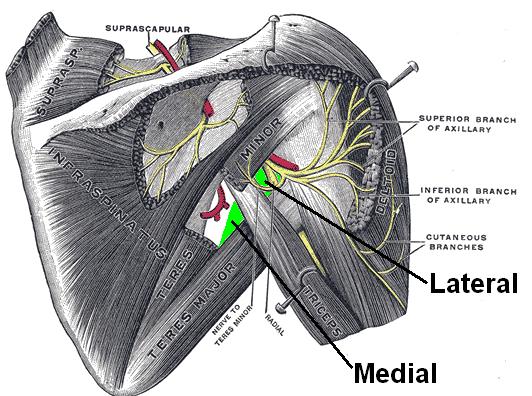
You can actually feel the nerves as thread so not hard to inject. Working out deltoid helps significantly.
Self massage of deltoid can be done nicely using a ball-peen hammer (warm under tap, little oil on skin)
However, the article on which this note is based refers to benefits of sleeping on one’s back:
Med Hypotheses. 2010 Apr;74(4):639-43.
Sleep position and shoulder pain.
Zenian J. abstract
Found sleeping on one’s back – ie.”decubitus” was the key to success.
- Their theory is people who are “dead weights” at night and don’t move much end up with pressure points that cause excessive pain in those spots. One would think this is predominantly deltoid but I have seen triceps muscles get inordinately sore especially in overweight individuals from laying on them too long.
- One bad pressure point is over the coracoid bone and if one sleeps on one’s stomach, one can get an anterior deltoid trigger as result (credit Dr. Chen Gunn there). coracoid pic here.
- I have actually see lateral end of scapular spine get sore in some cases, I suspect from sleeping on it as well. I t does seem to respond better to injections with bit of steroid in them so wonder if a local bursa is there…
Having said that, sometimes it feels better to rotate so you are on your scapular spine – – sort of half on your back and half on your side…
For direct pressure problems, better bedding helps. In:
B.H. Jacobson, H.A. Gemmell, B.M. Hayes and T.S. Altena, Effectiveness of a selected bedding system on quality of sleep, low back pain, shoulder pain, and spine stiffness, J Manipulative Physiol Ther 25 (2002), pp. 88–92. abstract here
Found use of special bedding reduced shoulder pains from 4.5/10 to 1.6/10 (61% improvement). I had a problem with sore shoulders and found the use of memory foam particularly helpful. You will not get a soft enough mattress by itself – who would buy a mattress that flattens out in 6-12 month? – ergo you need a memory foam topper.In:
Szollosi, T. Roebuck, B. Thompson and M.T. Naughton, Lateral sleeping position reduces severity of central sleep apnea/Cheyne–Stokes respiration, Sleep 29 (2006), pp. 1045–1051 – they used an airbag and got 32% improvement in pain. abstract here
also in:
Effect of prescribed sleep surfaces on back pain and sleep quality in patients diagnosed with low back and shoulder pain Original Research Article
Journal of Ergonomics In Press, July 2010
Bert H. Jacobson, Ali Boolani, Guy Dunklee, Angela Shepardson, Hom Acharya abstract here
Found memory foam significantly improved shoulder situation:
Memory foam can make it more difficult to roll over at night and that might mitigate its benefits.
Another bed treatment option was the use of woolen undergarments, 1 cm woolen bed pad, and a woolen pillow. It brought Fibromylagia pains from 7.9/10 to 1.3/10 after 6 weeks. Not sure how much for just shoulder but should help.
Kiyak, Emine Kara.
A new nonpharmacological method in fibromyalgia: the use of wool.
The Journal of Alternative and Complementary Medicine 15.4 (2009): 399-405.
http://www.bakogfyrir.com/wp-content/uploads/2012/07/Ull-Verkir-Rannokn-2009.pdf
- “composition of the woolen underwear was 75% merino wool and 25% acrylic fiber”
- 1-cm-thick woolen bed liner
- woolen pillow
- woolen quilt
- for 6 weeks.
- Felt helped by increased warmth, and cushioning.
- Felt this increased blood flow in skin
I added this Oct 2015 and I have to find a 1 cm woolen underlay – anyone know of a good place?
Recently, I came across an article meant for back pain in pregnancy but has a unique idea:
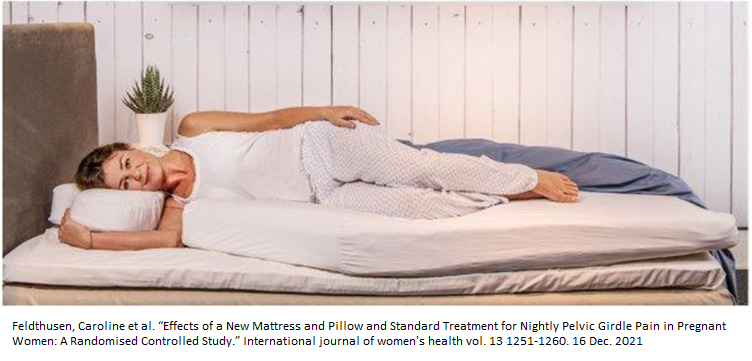 “A mattress and a pillow consisting of viscoelastic (memory) and normal foam that shapes around the body, wherein the pillow is separated from the mattress to reduce the pressure on the shoulder when sleeping on the side”
“A mattress and a pillow consisting of viscoelastic (memory) and normal foam that shapes around the body, wherein the pillow is separated from the mattress to reduce the pressure on the shoulder when sleeping on the side”
One lady side lying, just put a pillow under her upper chest, and that seemed to help. I found it took 3 pillows to take pressure off my shoulder…
Shoulder problems depend on the condition and I will have to discuss each in turn
- Shoulder bursitis & tendonitis – as soon as you lie down, the shoulder bone comes up and grinds your impinged rotator cuff and bursas. Only way to help that is to sleep sitting up in a recliner chair. I heard of one baseball player who was told he would never play again due to a bad shoulder. He slept sitting up for a month and then went back to playing…
- Sleep shoulder syndrome – I read about this in the 1970’s and have not been able to find reference since. It referred to the tendency to sleep with one’s arm over one’s head and rest one’s head on the shoulder. This causes rather pronounced deltoid soreness. I’m surprised how many I have found once I asked for it. Only thing I have suggested is to put arm in a pillow that is not overhead and hope it keeps it down. I gather that has not been that successful…
- Subscapularis Triggers – I found this muscle was one of the biggest problems to me sleeping,
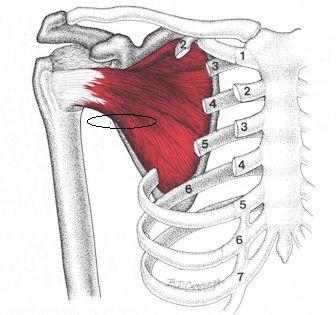
I found if I put my opposite thumb under my opposite shoulder blade about where drawn on pic; and rubbed back and forth 120 times, then the muscle would let loose some and I could sleep. Simon and Travell recommended putting a pillow between ribcage and arm in armpit to keep it stretched out a bit as well.
- Infraspinatus and posterior deltoid triggers – if you sleep with bad arm up and arm dragged across chest – that stretches it too much – a pillow to hold it up helps
Infraspinatus has been ascribed as a common cause of shoulder pain that’ “nonspecific” – ie. exam doesn’t point to much mechanically wrong. Recent I wrote about measure for dealing with it:
http://painmuse.org/?p=6400
including rolling a lacrosse or hard ball across it:
- First rib and scalene complex pain – I had almost neuralgic pain on my shoulder tip. – curling your fingers just behind your first rib by the cervical spine and pulling it forward while resting in bed gradually bought me relief and I could instantly fall asleep.
Sometimes the second rib area becomes sore as well – the area is often elevated and needs to be pushed down. – Put the mid three fingers of your opposite arm on the back top of your shoulder – then lift the elbow of your opposite arm – it will automatically push your second rib area down. Following. sometimes the 2nd rib area become too anterior and massaging horizontally just below collar bone laterally until tenderness is gone, will help that. Rubbing the second rib level just under collar bone laterally by shoulder until not sore helped the shoulder tip in back too
- Collar bone AC joint – This is on tip of shoulder and can be tested:
Testing For Shoulder AC Joint Pains
If joint is unstable, push just in from joint and pushing from front to back – might help – if it does, it is definitely unstable and could benefit from sugar “prolotherapy” injections to tighten joint up.
- Cervical spine – facets, discs and nerves can all refer to shoulder. I found using the inflatable cervical traction unit for up to 20 minutes gave considerable relief and then people could sleep.. for unit see here Neck Cheap Home Cervical Traction . The most researched pillow for the neck is a water filled pillow.
- Carpal Tunnel Syndrome – there are a series of cases described where nocturnal shoulder pains was caused by carpal tunnel syndrome – medial nerve compression at the wrist:
Clinical Orthopaedics & Related Research: May 1973 – Volume 92 – Issue – ppg 227-230
Shoulder Pain as the Presenting Complaint in Carpal Tunnel Syndrome
Kummel, Bertram M. M.D.; Zazanis, George A. M.D. abstract here
You would think most would also have numbness in had too. Most responded to carpal tunnel wrist surgery though three had frozen shoulder issues too. B6 100 mg only a day is helpful for carpal tunnel:
Carpal Tunnel Syndrome and Vitamin B6 http://painmuse.org/?p=3351
Addendum:
Journal of Manipulative and Physiological Therapeutics Volume 35, Issue 5, June 2012, Pages 407–412
Association Between the Side of Unilateral Shoulder Pain and Preferred Sleeping Position: A Cross-Sectional Study of 83 Danish Patients
Bo Kempf, Alice Kongsted
http://www.sciencedirect.com/science/article/pii/S0161475412000693
- Study found 67% slept on the painful shoulder
- “76% slept on the side opposite their partner (P < .001).”
- Conjectured that all it would take to get better is to switch sides with your partner…
Sleeping the direction of your partner might expose one to higher CO2 levels and so people sleep away?
Another suggestion I came across was the use of a counter-irritant topical rubbed over shoulder at bedtime: – one mentioned was Icy hot.:
http://www.icyhot.com/wheredoesithurt.html
There are topical anti-inflammatory agents as well – voltaren cream, and Pennsaid lotion (voltaren in DMSO – prescription only)- I have no info on effects for shoulder pains.
Addendum:
Came across a great suggestion for hanging arm over bed edge – I had thought of it but this give a good pic of its mechanics..
from:
http://www.shoulderdoc.co.uk/printarticle.asp?section=874&article=1237
states:
“Loss of sleep from night pain that might tip the balance toward surgery is sometimes relieved by so simple a measure as rearrangement of pillows and hanging the limb out of bed.”
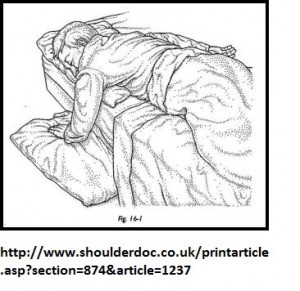
Addendum:
I felt the problem with my bed was the fact a hollow had developed where I lay. Having tried switching sides with my wife, I found the hollow allowed me to sleep on my stomach – – my favorite – pillow right side of chest. Left arm under body in the hollow. side pillow placed so my chin supported ( or cup my chin with right hand). You can make yourself a hollow by getting a thinner foam piece – fold it over and cut out a hollow in one half the foam to match where your arm would be…
While looking for a new mattress, came across this site:
How to Buy a Mattress
http://www.getrichslowly.org/blog/2009/07/17/how-to-buy-a-mattress/
article states:
“If at least one of you spends a lot of time sleeping on your side, if you go with an innerspring mattress I recommend a Simmons Beautyrest. The coils are uniquely designed and are great for side-sleepers because they are “individual pocketed” rather than all connected together like on most beds. Also, if either of you move around a lot and disturb the other person, the Simmons Beautyrest will cut down on that disturbance some. Second choice would be a a Sealy Posturepedic, which is what I have. It is a brand more designed for back-sleepers, but they make great beds.”
Personal Experience:
I got a beautyrest but it flattens out within 6-12 months though the hollow does give my arm somewhere to lay. The arm would go numb if under me but this got better with the B6 100 mg/day.
* I have found soft pillows are critical for sleep and lay 3 small soft pillows I got from Walmart – overlapping by several inches. Then I sleep with shoulder on first one and second and head on 2nd and third. Sometimes I think a large soft pillow would be better but still looking for that. Celebrex 200 at night helps not only by being anti-inflammatory but also because it is a painkiller.
I sleep on my stomach with a side lying pillow propping me up some, or on my back.
I was amazed how important the skin nerves are to the shoulder pains – many actually down the arm to the elbow but seem to refer to elbow. Skin nerve desensitiztion took off after a study finding benefit in back pain:
Lyftogt J.
Prolotherapy for recalcitrant lumbago.
Australas Musculoskeletal Med 2008;13(5):18-20.
http://www.prpseminar.com/ext/wp/wp-content/uploads/2011/11/Prolotherapy-for-recalcitrant-lumbago-John-Lyftogt-AMM-May-2008-pp-18-20.pdf
 If you transversely tug on the skin you will find tenderness. Injecting every cm with a bleb of D5W (I add 3% glycerin) will desensitize these nerves though will have to be repeated. Came across a video describing neural prolotherapy for just the elbow here:
If you transversely tug on the skin you will find tenderness. Injecting every cm with a bleb of D5W (I add 3% glycerin) will desensitize these nerves though will have to be repeated. Came across a video describing neural prolotherapy for just the elbow here:
https://www.youtube.com/watch?v=pCqWl9ACMwg
There are multiple nerve bands that come down various bundles of the deltoid muscle – if you massage with the arm propped up you can feel them as tender strands. Injecting every cm with D5W- 3% glycerin helps there too.
I would follow those nerve trunks up to the shoulder or close too if tender.
I don’t go as deep as he does in the video but that’s just me. There are tracts coming down with the triceps posteriorly as well that need doing. On hefty people the triceps area become particularly sensitized and might include knots in muscle that need treating.
The worst are in the upprer triceps and I just curl my fingers around the knots and pull them forward – could take 5-10 minutes to release. Then go down to tight tracts to elbow doing the same.
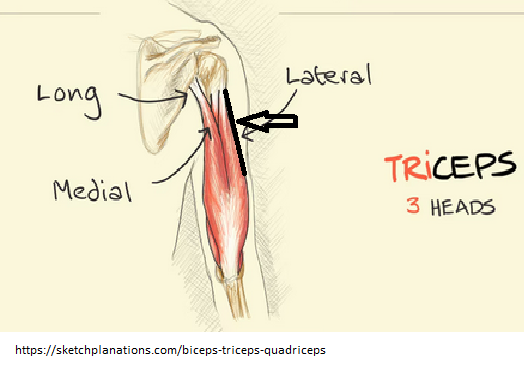 I am still thinking of trying a waterbed…. – anyone had success there?
I am still thinking of trying a waterbed…. – anyone had success there?
What sort of measures have helped others?
Addendum – I mentioned a mattress article above and author emailed me to say:
My name is Jen and I’m a writer at Jen Reviews. I was doing research on mattresses and just finished reading your wonderful blog post: http://painmuse.org/?p=331
In that article, I noticed that you cited a solid post that I’ve read in the past: http://www.getrichslowly.org/blog/2009/07/17/how-to-buy-a-mattress/
I just finished writing a guide that is even more detailed, updated and comprehensive on how to choose a mattress – 9 factors to consider according to science. It is over 7,000 words and packed with practical tips and advice. You can find it here:
https://www.jenreviews.com/mattress/
If you like the guide we’d be humbled if you cited us in your article. Of course, we will also share your article with our 50k newsletter subscribers and followers across our social platforms.

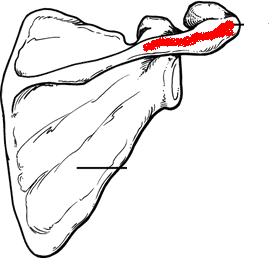
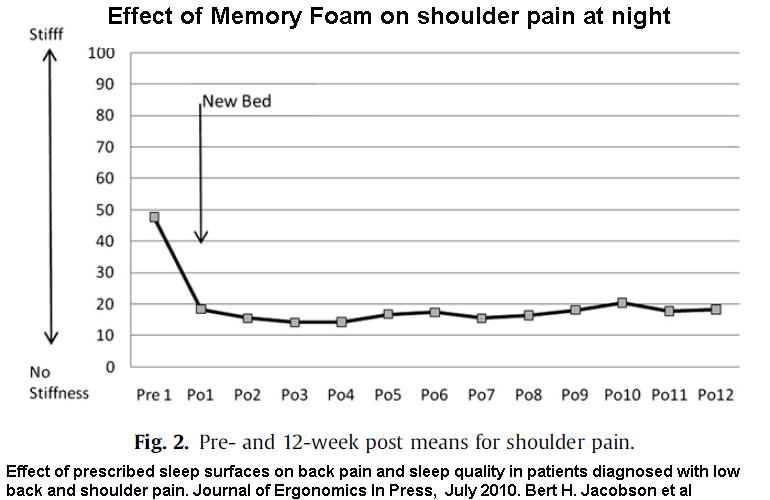

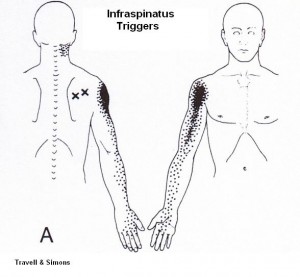

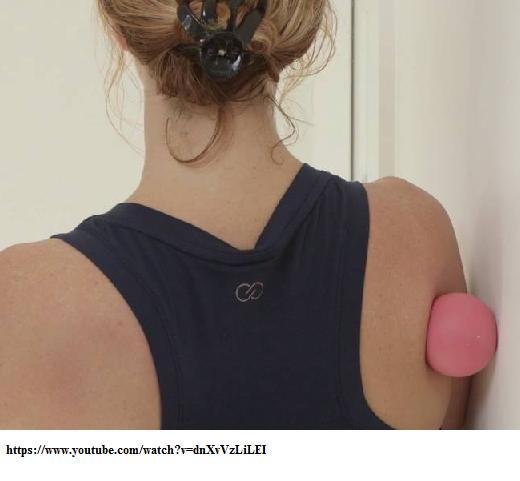
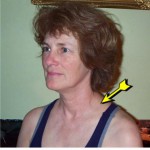
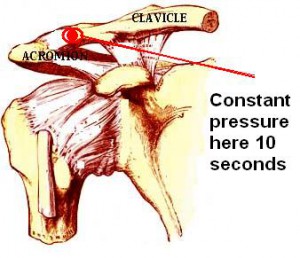
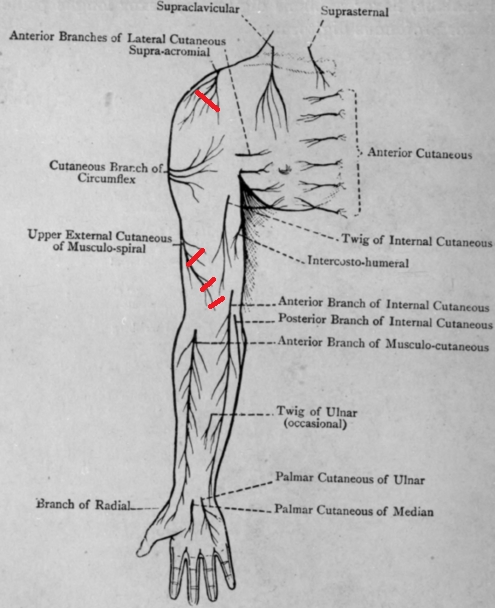
Sleeping in the supine position would be a good way to prevent or recover from shoulder pain. Using a low pillow helps as a high pillow is likekly to cause one to turn over. It is possible that one might turn over and assume the decubitus position after falling asleep. In that case sleeping in a recliner or a bed that has an adjustable back (the kind of bed used in hospitals) can prevent turning over. It has been suggested that the decubitus position is beneficial to patients with sleep apnea. For such patients sleeping in the supine position would not be recommended.
Dr. Zenian is the author of original article. I am honoured to have him comment.
admin
Though I mentioned how the neck is a player in noctural shoulder pain, I neglected to mention that special cervical pillows might help. Mediflow water-fill pillows are an example.
Cervical Pain: A Comparison of Three Pillows
Lavin RA. Research conducted at Johns Hopkins University School of Medicine.
Archives of Physical Medicine and Rehabilitation 78 (February 1997) 193-198
free article here:
http://www.mediflow.com/pdfs/JohnsHopkinsStudy.pdf
You touch facet areas on the side of your neck (facets are just back of the side bumps). Try to get filled such that the facets are less tender in the AM. (These are heavy once filled and can’t be moved…)
admin
Another option to problems shoulder sleeping is trying to sleep on one’s stomach. There is a mechannical aid to help you do that and I wrote about it here:
How Can One Sleep On One’s Stomach ?
here:
http://painmuse.org/?p=311
Unfortunately it is meant for naps sitting up – it doesn’t mention how it works in bed.
Anyone got advice there?
admin
Everyone sleeps with the arm in the position of impingement, probably from a very young age. Since you’re asleep you are probably unaware of this. After awhile, the shoulder may become denervated and asymptomatic (not the neck!). This is just one pathological sleep position that needs further study. There are others. It is not just overhead occupations and overhead sports in which the shoulder gets damaged. Every night we may re injure the shoulder when it is overhead, or under the pillow. Over time this chronic impingement takes its toll. At age 35 we start to have neck and shoulder aches, and at age 65 spontaneous rotator cuff tears. The answer to the question is to literally tie the arm down at night so it isn’t impinged, with a device. If the device is on in the morning you will get better. If you habitually sleep impinged, you may rip off that device, and find it is off in the morning, and you won’t get better. Sleeping in a recliner works because the arms are down. Sleeping on the belly is not good because then both arms go overhead.
Dear Jerrold – I have this issue – sleeping with my arms above my head every night. Can you recommend a device? Or suggest what this device might look like? Thanks, Vuta
I am a shoulder pain sufferer. I invented a sleep aid device that should be able to finally solve the problem. The device is still being finalized. I am looking for people willing to test it and provide feed back.
I’d be willing to test and provide feed back on your sleep aid device. I’ve been suffering with shoulder pain for about a year to the point it’s nearly impossible to sleep more than two hours at a time without needing to turn. Stretches and massage therapy have helped to loosen the shoulders but unless I sleep on a slight angle (not directly on my side), I have a problem. I’d like to sleep again!
Kathy, my device intends to provide exactly that: sleeping on a slight angle AND without impact on the shoulder. Here is my email: 2007bestever@gmail.com. Please contact me and I will send you detailed information.
we are willing to try the pillow, how do we do that?
both shoulders-partial tears,arthritis,tendonitis,bursitis,bone spur.HELP!!!!!
Cannot sleep or reach above, behind my back, into the back seat of car. Radiates to hand forearm is extremely painful.
____________
Stacey:
Sounds like you may have both shoulder and neck issues. Must be horrible. Getting work on either one will help other but either one can also set off other…Having an injection in shoulder would be a good start.
Another approach would be oral steroids which could help neck and shoulder – you can suggest to your doctor – comes from a study I was writing up but never finished:
Three cases of severe neck pain with radiation down arm, not helped by any other measure, were helped with mini-pulse therapy of betamethasone 4 mg twice daily for 4 days and decreasing doses subsequently. In these 3 cases, pain disappeared after 10 days.
Masui. 2012 Dec;61(12):1359-61.
[Three patients with cervical disc herniation whose severe pain was relieved with oral mini-pulse therapy of betamethasone].
[Article in Japanese]
Hayashi N, Kanai A, Okamoto T, Okamoto H.
http://europepmc.org/abstract/MED/23362776
◾”Three patients with severe neck and radicular pain due to cervical disc herniation was not relieved of pain by common drug medication such as NSAIDs and anticonvulsants.”
◾They used betamethasone 0.5 mg tablets eight tablets before breakfast and lunch for 4 days and then half every 4 days until stopped on day 16.
◾”In all patients, the pain disappeared completely within the opening 10 days of the therapy, and the pain did not relapse after the therapy”
◾”All adverse events of betamethasone including irritation, insomnia and overeating disappeared without medication within several days
Oral steroids have also been temporarily found effective for frozen shoulder so helps neck and frozen shoulder:
Buchbinder, Rachelle, et al. “Short course prednisolone for adhesive capsulitis (frozen shoulder or stiff painful shoulder): a randomised, double blind, placebo controlled trial.” Annals of the rheumatic diseases 63.11 (2004): 1460-1469.
http://ard.bmj.com/content/63/11/1460.short
To maintain those benefits, arthritis NSAID meds, massage to tightened muscles and physio to stretch out shoulder must be done. I now inject tender skin nerve tracts down the arm as well with D5W – dilute sugar water
What I don’t know is the state of your AC joint and rotator cuff…
Any suggestions out there?
I would test it.
I left the original message here in 2011 and must say that most people who contacted me and indicated their interest to test the device… dropped out as soon as they saw it. It was ugly, difficult to get in and out and I did not do a good job explaining exactly how it worked. I kept working on it and now, 8 years later, it is a lot friendlier and it can do a lot more. Visit my website http://www.gyrosleep.com
It has links to videos of the working prototype (I can help you build your own device) and the future commercial model.
thanks for all the good information.. here it is 2:35 am and im awake looking for the solution to my painful shoulders because both of them have become problematic due to impingement during sleep.. God bless you all for doing what you can to help others like myself who are finding out about this problem the hard way..
@ Michael Malakhov.. i will take you up on the offer if it is still available.. thanks!!
thanks again everyone..
ps, i also read that glucosamine and condroitin can help.. any thoughts??
I have tried the glucosamine with condroitin. No luck :(
It’s 2:09am and I too am looking online the Internet for a solution for bad shoulder pain. My bed is really bad. Probably need to get rid of it. I am willing to try your device as well.
I personally have developed shoulder pains lying on my side. It appears to be in deltoid muscle and only takes 5-10 minutes in certain positions to get sore. I have had to learn to sleep on my stomach and found that not as easy as I thought:
– first obstacle is the neck – it is forced into some rotation and complained; gradually it got used to it except when I slept on my left side/mostly abdominal. I then realized that I have a certain degree of bend-overness to my neck- thorax and if I sleep with my neck rolled down some it is more comfortable.
– next issue is the ear – my ear seemed forced down more vigorously into pillow and a hard pillow will create issues – a soft synthetic worked
– actual positioning took some time -one arm is under me with hand near groin/thigh. A thinner pillow is draped under me from shoulder to lower abdomen on that side and keeps that side up some. I’m not sure that would be comfortable except for my memory foam overlay.
– Last issue had to do with fact heads is on edge of a pillow facing down some to mattress. With my partner also having her pillow nearby, It seems that the air is not very fresh there. Quite by accident, we used a fan in hot weather and I realized a gentle movement of air helped considerably.
– Having said all this, I can travel and use firmer matresses fairly well – I suspect in my memory foam mattress topping, I do more dead drop sleeping while on a firmer mattress I turn more – which is also easier to do in a firmer matress.
– last thought is that it could be a mild form of external subdeltoid bursitis in area and robaxin or other anti-inflammatory-muscle relaxant seems to help but I haven’t needed them since I followed this approach. A more vigorous treatment would be daily anti-inflammatory meds but I haven’t bothered as well.
admin
I have supraspinatus tendonosis and am told biceps tendon and bursa implicated as well. For years I have slept on my stomach hugging one pillow in each arm and angling my head down. Now, with this injury I try to sleep on my back but can’t. I assume that it is bad to sleep on my stomach with my arms up, but honestly, its more comfortable than on my “good” side which hurts my ‘bad’ shoulder – guess I need a pillow under that arm. And oddly, snuggling up on my ‘bad’ side, with shoulder against the underneath-pillow, isn’t bad at all.
I can never sleep on my back – just lie there. Is it really bad to sleep on my stomach? Am I preventing healing by re-injuring my shoulder all the time?
You might get more heartburn sleeping on stomach and I’m told you can get more facial wrinkles tummy sleeping. I sleep on my stomach some and find it can sometimes make my neck sore as it is some twisted as I sleep. Unless you find it hurts the shoulder, it should not be a shoulder issue.
-admin
Good luck
Advice welcome!
I am so glad to have found this site! My shoulder pain (in both shoulders) has been attributed to an ergonomic issue, which was addressed some time ago, but it still comes and goes. I have a memory foam mattress topper, but it still hurts to sleep on my side. I’ve never been able to fall asleep on my back, and as I have sleep apnea (corrected by an oral device), it’s probably not a good idea anyway. Now I have some ideas how to change my sleeping position and a possible source of a positioning device, if those don’t work for me.
To offer something in return: I found an orthopedic site that suggested either using a device to hold the upper arm and shoulder in place while sleeping or wearing a nightshirt with the affected arm(s) inside.
——————
Only thing I could find was something that allows you to hold arm up over head with groove in pillow – can’t imagine holding arm up all that comfortable:
http://www.deluxecomfort.com/better-sleep-pillow-order.html
Only other thing has been an exercise regimen claiming to bust rotatory cuff:
http://articles.elitefts.com/products-reviews/rotatoreliever-an-effective-new-option-for-repairing-shoulder-injuries-rach-edit/
don’t have any experience with any
admin
Have gotten lots of good ideas here tonight. I’ve been dreading going to bed b/c I know that within 10 min. my shoulder will start to ache. I can’t believe that so many other people have this same exact problem. Going to try the arm inside the shirt, self massage, maybe someone’s devices that they sell.
I have just recently started experiencing sholder pain, especially when sleeping. I have been fairly hard on myself with sports etc but have not had any recent injuries or repedative activities. I like the explaination by Dr.Jerrold Gorski account a recent scan has shown a tear in my right tendon which I really can not figure how it happend. I am reading alot about devices that stablize the should but nobody has mentioned where they can get them. Some people say sleep on your back &I do not want to resort to sleeping in a chair. Any suggestions?
—————-
First of all, it would depend if you have a frozen shoulder – if arm movements are restricted in raising arm or getting hand behind you, a frozen shoulder is likely. I inject both the suprascapular nerve and the shoulder joint posteriorly (the latter with steroid) repeatedly to control that. I am quite aggressive about that, because you will not sleep until this is dealt with properly.
Secondly, it is important to know if pain is coming from rotator cuff or not – if you bring arm up as high as can and as you lower it, there is a zone where it catches (the painful arc)
http://www.massagetherapy.com/ce/content/images/478.jpg
This is not always present but helpful if seen and confirms either a rotator cuff or bursitis problem inside joint space area. Sleeping in recliner is a way to apply traction to take pressure off these tissues at night. Steroid injections would give temporarly relief though I like to inject suprascapular nerve repeatedly with 5% lidocaine and work the anterior deltoid out by hand.
Is the adductor O’brien’s test positive? http://painmuse.org/?p=843
Then, that includes possibly an AC joint issue and a small injection of cortisone can set that right – unless arthritic or unstable
If either is not present, then maybe a good massage can delineate whether deltoid or subscapularis, particularly, is an issue.
In general, the following measures might help
-accept you will be rolling over frequently
– sleeping on your back is probably the best measure. One writer suggested sleeping on back with palms up would take more pressure off rotator cuff, but I am not sure of that.
-sleep on your side position rotated more posteriorly so pressure is on shoulder blade
– sleeping with shoulder on extra pillow – you would think it puts more pressure on shoulder but it actually helps
– sleeping on side with a pillow on high lateral chest to lift up area and take pressure off shoulder
– creating a hollow where you lay your shoulder
– foam or memory foam – I have found too thick makes it difficult to roll over though and can cancel any benefits.
– sleep on stomach with one side propped up with pillow and your chin on the top of this pillow. Other side has arm under your body with hand in groin. Face may end up facing more downward and you might need a little fan blowing to that area to ensure fresh air. This could be harder on neck. You don’t need to sleep with arms up – hand on pillow side curl you index finger and thumb on top pillow and rest your chin on it; otherside have your hand under you so it touches your groin – maybe get used to it being some numb and ignore it.
– couple positions for particular muscles mentioned in my article.
– stop thinking about your shoulder – have something to dream about and concentrate on that instead.
– shoulder strengthening – done properly and not a rotator cuff issue – might help.
– deal with neck – special night pillow; do some neck traction before you sleep.
– deal with first rib – if sore pressing down IN FRONT OF your shoulder tip, your first rib might be sore. – lie down and relax; curl opposite fingers over shoulder tip trapezius and pull tissue forward and see if it gradually relieves the soreness.
– deal with upper sore ribcage by back of upper shoulder tip – on sore side – put fingers of opposite hand on back part of your shoulder tip – then lift elbow with hand of sore side – that will push fingers down on shoulder tip – do 3 times;
then put fingers just below collar bone in front and repeat manouver. Following that, massage rib levels on sore side in same area by rubbing opposite fingers in rib levels just below collar bone anteriorly just in front of arm pit. These manouvers will push ribs down and back and help sometimes.
– one writer said there was a device to help you sleep on your side – I have been unable to find it anywhere – if someone could leave info on that, it would help.
– obviously there are all sort of meds that can deal with inflammation and promote sleep that could help.
– You wanted something to stabilize the shoulder – this is called prolotherapy – it is the subject for research by one of my colleagues in Vancouver – stay tuned…
this is a list I have put together so far -anyone have something to add?
– admin
Had a recent patient with disabling pain right shoulder – denied by WCB because not rotator cuff. He had an extremely tender spot 2 inches/5cm down from shoulder tip where lower end of deltoid met the triceps muscle. After several injections (I use 5% lidocaine), it had improved. Found he only slept facing out and slept on right side of bed – so ended up sleeping on this spot all night long. When we came to that realization, he immediately got the implication – got to switch sides with his wife….
I asked my wife if we could switch sides, This was not well received: I’m sure if I had pushed the subject, she would have dialed 911 on me:
So I just gave up and am now sleeping on the couch, (and doing better some nights) every once in a blue moon, I miss my bed, and go there to lay my tired head down: It always end very badly, after 2-3 hrs of peaceful bliss, I awake in screaming pain:
I had right shoulder surgery, 2005. It took about 6 months to see the most benefit;
In 2010 I developed severe right shoulder pain, it made sleeping impossible, while flipping through TV channels, I landed on the home shopping channel, Dr. Ho was on with his tens machine, I ordered it asap; (I wish I would have known more about tens machines as I would have ordered the one for just over $100 that plugs into the wall or runs on batteries) well back to my story.
The Dr. Ho Machine has 4 pads, with finally figuring out the right placement, I finally beat the hell out of it and WALLA, the pain is a distant memory, (I hope it never comes back) I think maybe a nerve or tendon got jammed? but eh…. Dr. Ho Machine did the trick, my pain was at the front of my shoulder.
I also have Myofacial Pain syndrome left shoulder, originally diagnosed as tendinosis, unfortunately Dr. Ho won’t release the trigger points; It does help block the pain, and I find myself slipping off into dream land, with the machine on, it has 3 settings, 10, 20 and 30 minutes, I use the 30 mostly, I would like to try more trigger point injections, I had 2 sessions prolotherapy, 144 needles first time, with a demerol drip, 2nd time I tried it without the demerol drip, (HOLY CRAP) never again, 80 needles couldn’t tolerate the needles. Unfortunately, Dr. Cenaiko passed so can’t go back, RIP;
I cannot sleep on my left shoulder it causes instant PAIN, ice, heat, all offer zilch pain relief, there is a company called thermotex, in Calagary that sells infra red heaters,
http://www.thermotex.com/
they were on the home shopping channel last week, and had multiple testimonials, but alas, I cannot afford the $$$$ right now, so suffering is all I can look forward to, my chum told me how to deal with PAIN, (just take more pills) I have to admit) its better than suffering…
I’ve had 9 cortisone shots in my left shoulder, I was desperate for relief, ( I was crying like a baby) but knowing what I know now, I would of NEVER gotten a cortisone shot, without trying acupuncture, trigger point injection, prolotherapy first.
Very efficiently written information. It will be beneficial to everyone who employess it, including myself. Keep up the good work for sure i will check out more posts. aegfaddkdebe
I bought a tempurpedic rhapsody. I wake up in major pain. From my shoulder-blade to my wrist, like I have been clubbed. What a waste of money. I can no longer play my guitar.
Ian, I know how you feel. I have been dealing with gradually worsening shoulder impingement for about a year now. Finally decided yesterday that picking up the old strat just isn’t worth the pain anymore. Time to look into surgery…
Pingback: Left Shoulder Pain After Car Accident | Good Info Car Accident Laws
Pingback: Abdominal Pain At Night Only
HELLO. I VE READ ALL OF THE ABOVE. CAN I OUT A HOT WATER BOTTLE ON MY VERY SORE SHOULDER?
THANKS
CAROLINE
———————-
If your shoulder is inflamed, it might increase the swelling. However, if you find it helps, go ahead.
-admin
Pingback: Office Factors Related to Chronic Neck Pain | Pain Medical Musing